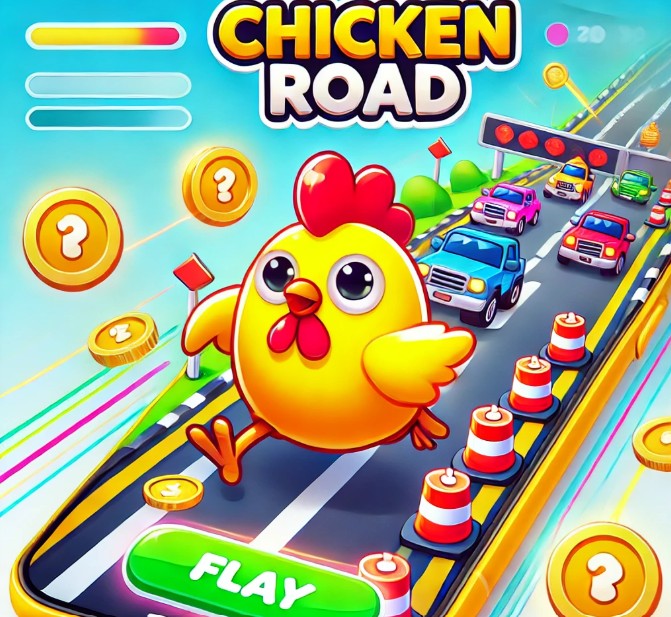In a digital space overflowing with quick-tap distractions and short-lived gaming trends, it’s not often that a mobile game carves out a niche with nothing more than charm, precision, and a surprisingly addictive concept. Yet, that’s exactly what this quirky little title does. Chicken Road doesn’t try to overwhelm with elaborate graphics or excessive features — it thrives on simplicity done right.
At first glance, you might assume it’s just another lane-crossing game in a crowded app store. But the moment you take control of your first daring chicken dash, you realize there’s more at play. Timing, pattern recognition, anticipation — these all blend to turn what could have been mindless fun into something that actually keeps your brain alert.
The chicken road app has managed to capture attention by making every second of gameplay feel like a small but meaningful challenge. There are no long tutorials, no gimmicky distractions. Just instinct, rhythm, and an ever-growing desire to beat your last attempt.
Whether you’re playing for five minutes on the bus or getting lost in it for an hour before bed, this game adapts to your time, not the other way around. That flexibility is exactly what modern mobile players appreciate — and it’s one of the reasons Chicken Road continues to stand out.
How Chicken Road turns simple mechanics into lasting engagement
What makes a mobile game truly addictive? It’s not flashy graphics or overcomplicated missions — it’s the loop that keeps you coming back. Chicken Road has perfected that loop. With just one objective — guide a chicken safely across busy roads — the game turns tension and timing into a compelling experience.
Each level gradually increases the difficulty, but never to the point of frustration. The roads become faster, the patterns more erratic, and the pressure builds in just the right way. The beauty lies in its ability to create tension without chaos. You know what you need to do, but doing it flawlessly is a test of focus and reflex.
Unlike games that bombard you with daily missions or endless notifications, Chicken Road respects your pace. Whether you’re in for a short burst or a deep dive, it adjusts without overwhelming. This thoughtful pacing creates a natural habit loop — a “just one more try” mindset — that turns even brief sessions into satisfying play.
The audio design, responsive controls, and intuitive layout all contribute to a fluid experience. You’re not fighting the mechanics — you’re immersed in them. This is what gives the game longevity: it doesn’t just entertain, it pulls you in without effort.
What the interface of Chicken Road gets right from the first tap
First impressions matter — especially in mobile gaming, where users drop off within seconds if something feels clunky or unclear. Chicken Road manages to avoid that entirely with an interface that feels like second nature from the moment you launch it.
Everything is laid out with purpose. The start screen is clean, the settings are exactly where you’d expect, and there’s no unnecessary noise. You’re guided directly into the action without friction. No long onboarding, no pop-ups asking for reviews, and no cluttered UI blocking your focus.
Controls are optimized for one-hand play, which makes it ideal for gaming on the go. The touch sensitivity is finely tuned — tap to move forward, swipe to dodge, and everything responds instantly. There’s a satisfying rhythm to movement, creating a feedback loop that just feels good.
What’s even more impressive is that all this is accomplished without overcomplication. Chicken Road doesn’t rely on multiple menus or flashy menus to impress. It just delivers functionality that works every time you open the app. That quiet efficiency is what sets it apart from so many other casual titles.
Why Chicken Road appeals to both casual and competitive players
It’s rare to find a mobile game that manages to entertain players with entirely different goals — those who just want to kill time and those who obsess over high scores. Chicken Road accomplishes this balance effortlessly. Its structure invites anyone in but subtly challenges them to keep improving.
The entry point is welcoming. With no mandatory tutorials or sign-ups, players can begin immediately. There are no power-ups to memorize or complex features to unlock before the game feels rewarding. But after just a few rounds, patterns begin to emerge. Roads get busier, timing windows shrink, and the player realizes that success depends on precision, not luck.
This shift from relaxed to razor-focused play happens naturally. For casual gamers, the satisfaction comes from a few successful runs during downtime. For competitive players, the appeal lies in pushing limits, measuring improvement, and chasing leaderboard positions — even if it’s just a personal best.
The lack of distractions helps. There’s no social feed, no bloated reward system. It’s just the player and the road. And in that simplicity, the game finds its broad appeal. No matter the playstyle, the tension remains genuine and the reward always feels earned.
Common mistakes new players make and how to avoid them
Every new game has a learning curve, and while Chicken Road keeps things simple, some habits can still get in the way of success. Recognizing these early on can help players progress more smoothly and enjoy the game without unnecessary frustration.
Here are a few of the most frequent pitfalls — and how to stay clear of them:
- rushing without scanning the path ahead;
- tapping too rhythmically instead of reacting to movement;
- ignoring side paths that offer safer routes;
- playing with distractions, like background noise or multitasking;
- restarting too quickly without analyzing what went wrong;
Each of these mistakes stems from the same root: underestimating the game’s depth. While the controls are minimal, the success lies in awareness and adjustment. Players who learn to anticipate instead of react often last longer and make fewer repeat errors.
More importantly, staying calm is key. The game is designed to nudge players into risky choices under pressure. Recognizing that — and resisting the urge to rush — is what separates a new user from an experienced one. Patience, not speed, often leads to the highest scores.
What makes the difficulty curve of Chicken Road so effective
One of the hardest things to get right in mobile gaming is difficulty progression. Too easy, and players get bored. Too hard, and they give up. Chicken Road manages to strike a rare balance that encourages learning without causing frustration.
At first, the game gives you breathing room. The roads are slow, patterns are forgiving, and there’s time to react. But very subtly, everything tightens. Cars move faster. Intervals between gaps shrink. The player isn’t overwhelmed all at once, but rather pulled into a steadily increasing challenge that rewards awareness and control.
This kind of design feels respectful — it trusts the player to improve. There’s no hand-holding or artificial gating. Each new level is an opportunity to sharpen focus and test timing. And since retries are instant, there’s little friction in trying again. The result is a gameplay loop that keeps players in the zone. They rarely rage-quit, because every failure feels like a missed opportunity, not an unfair trick. And every success feels deserved, making progression especially satisfying. It’s a masterclass in how to build difficulty that doesn’t punish — it invites.
Why Chicken Road deserves a spot on your device in 2025
With so many mobile games competing for attention, standing out requires more than flashy design. A game needs to offer value — not necessarily in rewards or unlockables, but in how it respects the player’s time and attention. Chicken Road does exactly that.
This is a title built for the modern pace of life. You can play it for 30 seconds or 30 minutes. It doesn’t demand daily logins or bombard you with pop-ups. Instead, it provides a consistently rewarding experience that adapts to your schedule, not the other way around.
Players keep it installed not because it’s trendy, but because it’s reliable. When you’re bored, need a break, or want a mental refresh, it delivers. And that utility — that sense of always being there without demanding anything in return — is part of its lasting appeal.
Even as newer games come and go, few manage to provide the same feeling of flow and simplicity. Chicken Road is easy to pick up, satisfying to master, and endlessly replayable. For those reasons alone, it earns its place as a go-to title heading into 2025.






